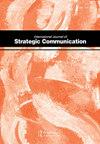关系培养与社会资本:女性跨国企业家在社交媒体上基于关系的沟通
IF 1.9
Q1 COMMUNICATION
International Journal of Strategic Communication
Pub Date : 2022-03-15
DOI:10.1080/1553118X.2021.2005069
引用次数: 1
摘要
摘要本研究利用关系管理理论、社会资本理论和跨国创业文献的跨学科见解,探讨韩裔美国女性跨国企业家(FTEs)如何培养与公众的关系,并在社交媒体上识别和建立社会资本。对在旧金山湾区和硅谷从事社交媒体业务的16名韩裔外派员工进行深度采访的结果显示,外派员工将顾客、业务伙伴、社交媒体影响力者视为他们的主要对象。研究结果还显示,除了现有文献中确定的fte独特的关系培养策略(例如,建立网络,分担任务,无条件支持,说双赢或不交易)之外,还发现了新的策略(例如,分享身份和兴趣,主动拓展,关注社会关系而不是准社会关系)。fte需要将社会资本结合起来,并补充在社交媒体上获得的桥梁社会资本。研究结果还显示了结构和关系社会资本的跨国性质,以及文化遗产在认知社会资本中的重要性。讨论了理论和实践意义。本文章由计算机程序翻译,如有差异,请以英文原文为准。
Relationship Cultivation and Social Capital: Female Transnational Entrepreneurs’ Relationship-Based Communication on Social Media
ABSTRACT Drawing on interdisciplinary insights from relationship management theory, social capital theory, and transnational entrepreneurship literature, this study explores how Korean-American female transnational entrepreneurs (FTEs) cultivate relationships with their publics and identify and build social capital on social media. In-depth interviews with 16 Korean American FTEs who are social media-based, small-business owners in the San Francisco Bay Area and Silicon Valley revealed that FTEs identified customers, business partners, and social media influencers as their key publics. Findings also revealed that in addition to FTEs’ unique practices of relationship cultivation strategies identified in existing literature (e.g., networking, sharing tasks, being unconditionally supportive, saying win–win or no deal), new strategies (e.g., sharing identity and interest, proactive outreach, and focusing on social over parasocial relationships) were also discovered. FTEs had the essential need for bonding social capital with the supplement of bridging social capital garnered on social media. Findings also showed the transnational nature of structural and relational social capital, as well as the importance of cultural heritage in cognitive social capital. Theoretical and practical implications were discussed.
求助全文
通过发布文献求助,成功后即可免费获取论文全文。
去求助
来源期刊

International Journal of Strategic Communication
Social Sciences-Sociology and Political Science
CiteScore
3.40
自引率
0.00%
发文量
39
期刊介绍:
The International Journal of Strategic Communication examines the philosophical, theoretical, and applied nature of strategic communication, which is “the purposeful use of communication by an organization to fulfill its mission.” IJSC provides a foundation for the study of strategic communication from diverse disciplines, including corporate and managerial communication, organizational communication, public relations, marketing communication, advertising, political and health communication, social marketing, international relations, public diplomacy, and other specialized communication areas. The IJSC is the singular forum for multidisciplinary inquiry of this nature.
 求助内容:
求助内容: 应助结果提醒方式:
应助结果提醒方式:


